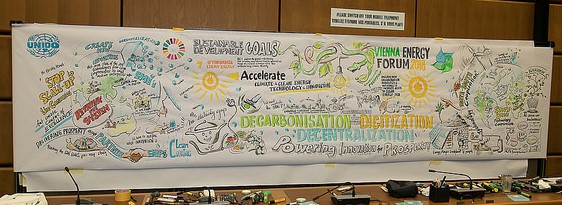By Beatriz Mayor, Research Scholar at IIASA
On 14 and 15 May, Vienna hosted two important events within the frame of the world energy and climate change agendas: the Vienna Energy Forum and the R20 Austrian World Summit. Since I had the pleasure and privilege to attend both, I would like to share some insights and relevant messages I took home with me.

Beatriz Mayor at the Austrian World Summit © Beatriz Mayor
To begin with, ‘renewable energy’ was the buzzword of the moment. Renewable energy is not only the future, it is the present. Recently, 20-year solar PV contracts were signed for US$0.02/kWh. However, renewable energy is not only about mitigating the effects of climate change, but also about turning the planet into a world we (humans from all regions, regardless of the local conditions) want to live in. It is not only about producing energy, about reaching a number of KWh equivalent to the expected demand–renewables are about providing a service to communities, meeting their needs, and improving their ways of life. It does not consist only of taking a solar LED lamp to a remote rural house in India or Africa. It is about first understanding the problem and then seeking the right solution. Such a light will be of no use if a mother has to spend the whole day walking 10 km to find water at the closest spring or well, and come back by sunset to work on her loom, only to find that the lamp has run out of battery. Why? Because her son had to take it to school to light his way back home.
This is where the concept of ‘nexus’ entered the room, and I have to say that more than once it was brought up by IIASA Deputy Director General Nebojsa Nakicenovic. A nexus approach means adopting an integrated approach and understanding both the problems and the solutions, the cross and rebound effects, and the synergies; and it is on the latter that we should focus our efforts to maximize the effect with minimal effort. Looking at the nexus involves addressing the interdependencies between the water, energy, and food sectors, but also expanding the reach to other critical dimensions such as health, poverty, education, and gender. Overall, this means pursuing the Sustainable Development Goals (SDGs).

Vienna Energy Forum banner created by artists on the day © UNIDO / Flickr
Another key word that was repeatedly mentioned was finance. The question was how to raise and mobilize funds for the implementation of the required solutions and initiatives. The answer: blended funding and private funding mobilization. This means combining different funding sources, including crowd funding and citizen-social funding initiatives, and engaging the private sector by reducing the risk for investors. A wonderful example was presented by the city of Vienna, where a solar power plant was completely funded (and thus owned) by Viennese citizens through the purchase of shares.
This connects with the last message: the importance of a bottom-up approach and the critical role of those at the local level. Speakers and panelists gave several examples of successful initiatives in Mali, India, Vienna, and California. Most of the debates focused on how to search for solutions and facilitate access to funding and implementation in the Global South. However, two things became clear. Firstly, massive political and investment efforts are required in emerging countries to set up the infrastructural and social environment (including capacity building) to achieve the SDGs. Secondly, the effort and cost of dismantling a well-rooted technological and infrastructural system once put in place, such as fossil fuel-based power networks in the case of developed countries, are also huge. Hence, the importance of emerging economies going directly for sustainable solutions, which will pay off in the future in all possible aspects. HRH Princess Abze Djigma from Burkina Faso emphasized that this is already happening in Africa. Progress is being made at a critical rate, triggered by local initiatives that will displace the age of huge, donor-funded, top-down projects, to give way to bottom-up, collaborative co-funding and co-development.
Overall, if I had to pick just one message among the information overload I faced over these two days, it would be the statement by a young fellow in the audience from African Champions: “Africa is not underdeveloped, it is waiting and watching not to repeat the mistakes made by the rest of the world.” We should keep this message in mind.

You must be logged in to post a comment.